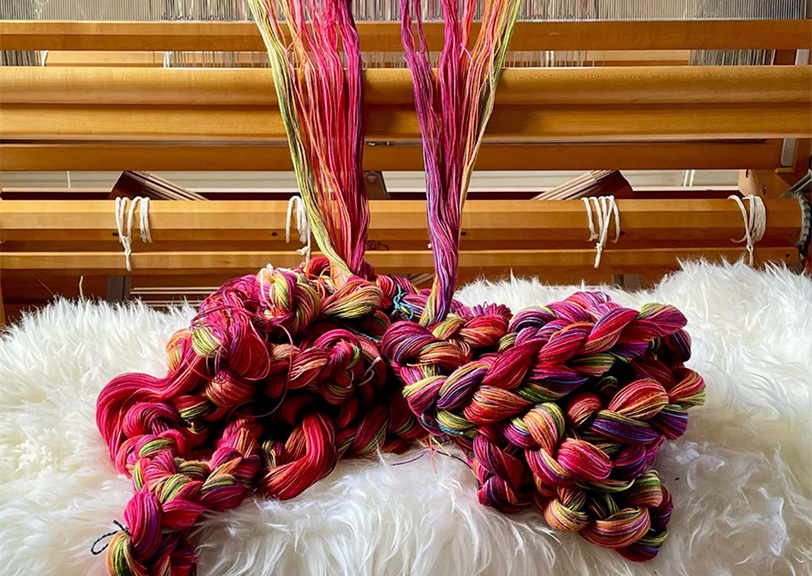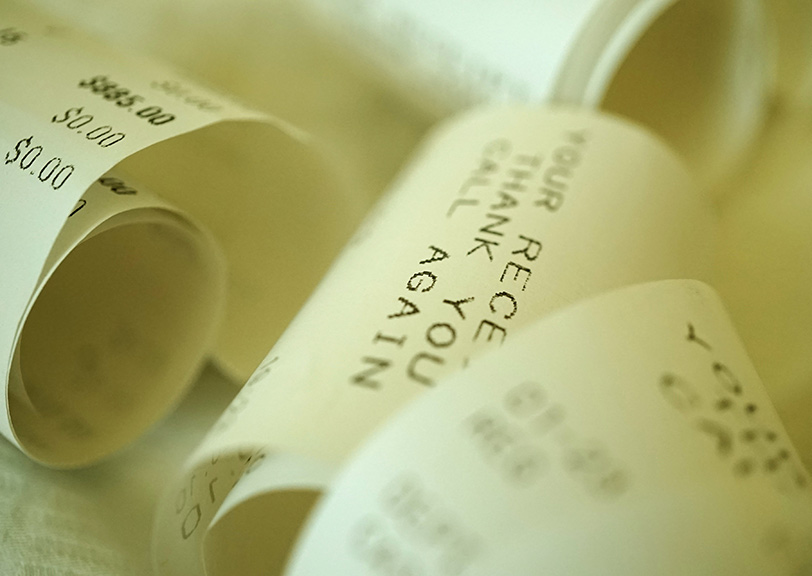ENTER YOUR EMAIL TO RECEIVE OUR WEEKLY NEWSLETTER
Portraits of Immigrants in New York
Betsy Ashton tells the stories of everyday immigrants living in New York.
By Karen Feld
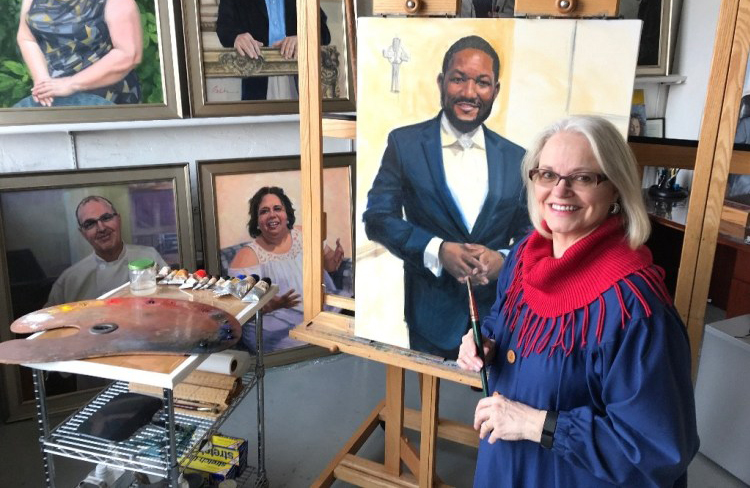
Betsy Ashton in her studio with the portrait of Porez Luxama. Photo by Steven Speliotis
. . . . . . . . . . . .
Who are the people seeking to cross our border? Award-winning reporter and artist Betsy Ashton combines her unique talents and curiosity to find the answer. “They are like you and me,” declared Ashton. “For the most part, they are a self-selecting group of gutsy, entrepreneurial and courageous individuals who have struggled through hardships to initiate a new life in America. That is the foundation of America.”
Ashton, 74, The multi-talented New Yorker, who grew up in Trenton, NJ was a longtime CBS consumer reporter and public speaker. After a successful career in broadcast journalism in both DC and NY, she turned her creative effort to another life long passion, art, which proved to be a successful second career. Former Ambassador to the Court of St James Phil Lader and actor Hal Holbrook are among those who commissioned her to capture their essence in rich Vasari oils on canvas.
The idea for the immigrant project came to Ashton one day while worshipping at St. Thomas Church Fifth Avenue in NYC. It was not only her passion and compassion for individuals but her innate news sense that motivated her to tell the story of immigrants as good samaritans. “My journalism blood started to boil,” she said. “Presidents are supposed to bring people together.”
The result was her in-depth exploration, “Portraits of Immigrants: Unknown Faces, Untold Stories,” a life-like exhibition of oils with words. The 16 portraits comprise Ashton’s first major solo exhibition. She shows the essence of America through her interviews and portraits of immigrants, many of them women, much like those who have helped and will continue to shape our country in arts, science and entrepreneurial spirit. It was apropos that the exhibit opened last month in that same church, coincidently adjacent to MOMA.
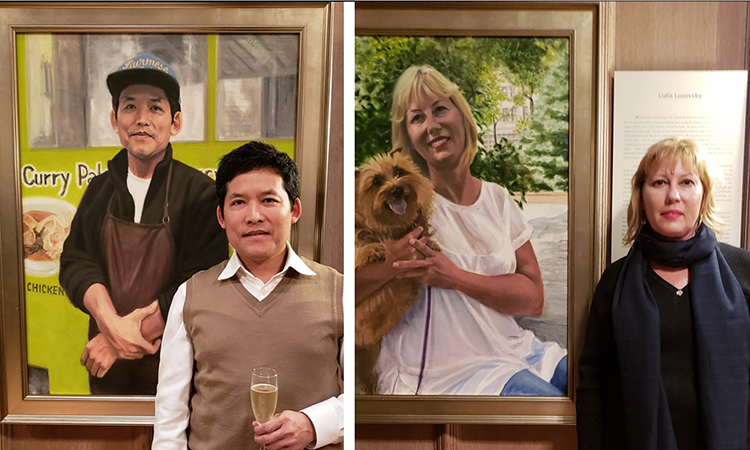
Myo Thway from Burma and Lidia Lozovsky from Ukraine are beside their portraits at the opening reception. Photos by Reiko Yanagi and appeared in Vasari Classic Artists’ Oil Colors.
. . . . . . . . . . . .
The hardship of everyday people—struggling to feel safe and feed their children—and sacrificing to give their kids a better shot at life, forced them to flee and come here. People don’t flee if they feel safe and are employed but that wasn’t the case with the war in Afghanistan, political corruption in Haiti, and crime in Brazil. “They took risks. That’s entrepreneurial spirit,” Ashton said. “That’s what we’ve celebrated, what made America great, the human capital.” She added, “For me it’s reinforced the fact that they are good neighbors and good people with dreams and hopes.”
Ashton’s passions are “talking to people” and “pushing paint around.” She remembers as a kid when she was bored in class, she turned her attention to sketching the teacher. When she was a reporter covering the courts in Washington, DC, she did her own courtroom sketches.
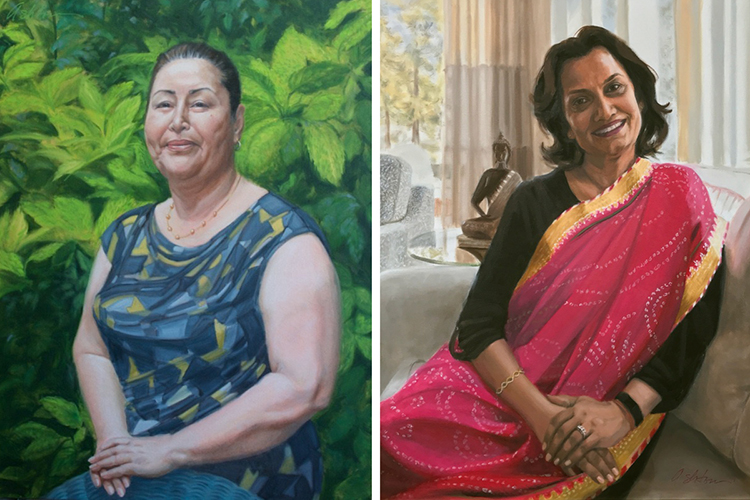
Maria Salomé, a housekeeper from Guatemala, and Rekha Singh, a teacher from India.
. . . . . . . . . . . .
Trump’s presidential campaign focused Ashton’s realization that America has been built on immigrants. Her own family came here generations ago from England, Scotland, Wales and Germany. She used her journalistic curiosity and artistic eye to get to know recent immigrants, those from the past two or three decades. What did they leave behind and why? What difficulties did they encounter settling here? What is their life like now? “New York City has the largest number of foreign born people—immigrants—of any US city,” says Ashton. She wondered, “What was it like coming here and settling in? Who are these everyday people we interact with?”
“The ladies of leisure of John Singer Sargent are not the immigrants I’m painting,” explained Ashton. The people she’s painting are much too busy to sit that long. For that reason she works from photos and sketches in natural light. “I know what to leave out,” she says. “Photos are hard-edged all around. I have a focal point. I want to relate to the person. I want the viewer to go right to the heart and eyes.”
These people left their homelands for a reason—politics, poverty. “They were gutsy entrepreneurs,” explains Ashton who passionately spent the past two years working on this project. She sketched while interviewing her Australian Terrier, Banjo’s, groomer from the Ukraine; the nurse from Poland who draws her blood; the doorman from Ghana who was proud to study for his citizenship test; and Maria Salome who had a choice between becoming a sex worker in Guatemala or finding help to cross the border into the US to get other work.
“I want to relate to the person. The eyes go to the heart and soul of the person,” explains Ashton. “I pay attention to what people say, how they move and the way they express themselves.”
Each story is different—different countries, different cultures, different religions. She discovered the essence of each person and what has meaning in each life—generally it’s their work. Chinese immigrant John Lam, who began as a dishwasher in a Chinese restaurant when he was 17, later worked up the ranks in a garment factory and is now one of the largest employers in New York’s Chinatown.
Words matter. We are hearing vile language—criminals, drug lords—about immigrants from our President. “It’s not really right to come in illegally, but our system is out-dated,” says Ashton. “It’s the good people who are risking their health to come through Mexico.” The communicator uses the analogy of a plane crash. We don’t ground all planes just because one bad egg gets into the country. In the same way, America shouldn’t ban all immigrants. We know millions of people landed safely; the crash is an aberration just like the immigrants.
Ashton, now living in Long Island City with her fourth husband—they met through their mutual opthamologist—says she’s “proud to be alive.” Her goal is to “stay healthy,” continue following her passions and save this country. America was an idea that’s revolutionary to have a strong broad middle class. She’d like to see a woman in the White House who cares about the public good.
“I’m not finished yet,” says Ashton, “this is just the beginning.” She intends to interview and paint two more immigrants, a Syrian refugee and perhaps a Venezuelan one. She uses her craft and carefully honed natural talent to explore social issues. “I want to use media to educate not infiltrate.” She added, “I would like to feel I’ve had some influence on making this country better.”
“My exhibit five years ago would have been a Fourth of July celebratory exhibit in any town hall in the country,” reflects Ashton. “These stories are much like ones we celebrated. These individuals are in America to build, not to take away.” It’s the survival skills that make America. She hopes this exhibit “opens hearts and minds.
Don’t miss Ashton’s exhibition, Portraits of Immigrants, at The Riverside Church in Morningside Heights, March 6 through April 22, 2019, before it tours the U.S.
. . . . . . . . . . . .
Karen Feld is an award-winning writer who wrote a syndicated column on the Washington-Hollywood connection for many years. She launched The Buzz column in The Washington Examiner and was Washington editor of the Delta Airlines in-flight magazine, and #FlyWashington Magazine.
Other articles by Karen Feld:
Solo Getaway: Unique East Coast Inns
Pickleball: A Popular New Sport
Marilyn Maye: Performing at Age 90



